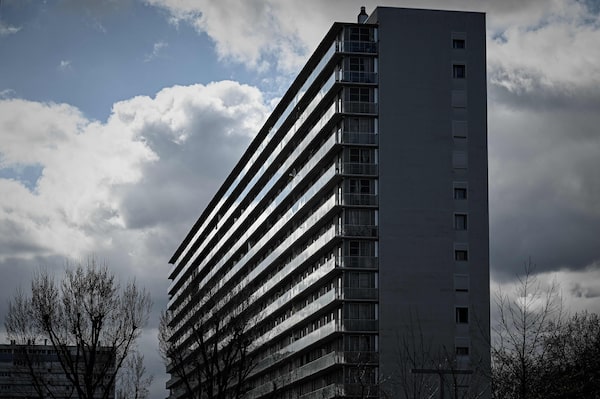A home with a fibre-cement sheeting façade by architects Anne Lacaton and Jean-Philippe Vassal, winners of the 2021 Pritzker Prize.LAURENT CHALET/The New York Times News Service
The Pritzker Architecture Prize, the field’s highest honour, has been awarded to the Paris-based duo of Anne Lacaton and Jean-Philippe Vassal for “prioritizing the enrichment of human life,” especially in the context of public housing.
The selection of the French laureates, who have long focused on creating more livable structures that connect to nature in even the densest of urban settings, was announced Tuesday by Tom Pritzker, chairman of The Hyatt Foundation, which sponsors the award.
“Through their design of private and social housing, cultural and academic institutions, public spaces, and urban developments, Lacaton and Vassal re-examine sustainability in their reverence for pre-existing structures, conceiving projects by first taking inventory of what already exists,” organizers said in a statement. “By prioritizing the enrichment of human life … they are able to benefit the individual socially, ecologically and economically, aiding the evolution of a city.”
In her own remarks, Lacaton noted that “good architecture is open – open to life .... It should not be demonstrative or imposing, but it must be something familiar, useful and beautiful, with the ability to quietly support the life that will take place within it.”
Architects Anne Lacaton, left, and Jean-Philippe Vassal.LAURENT CHALET/The New York Times News Service
In an interview from Paris, the pair explained how the global pandemic has reinforced their long-time view that people deserve open space and a connection to nature, even when living in housing projects in dense cities.
“It’s clear that in one year many things have changed, especially in terms of our relationship with space,” Lacaton said. “We have all been forced to stay home. It has clearly made visible that living space is extremely important.”
She noted the duo had long focused on the theory that “more generous space is extremely important for everyday life. We have made efforts to always develop more space than the standard that’s requested. So for us this is a confirmation .... generosity of space is extremely important for everyone and is not connected to how much money you have.”
Added Vassal: “We believe more and more that we have to open spaces to the natural elements – to air, sun, and natural light.” One of the ways the pair attempts to connect the inside to the outside, he said, is the model of an apartment opening onto a greenhouse-like enclosed conservatory or “winter garden,” which itself opens onto a balcony. “It’s a way of bringing the concept of a house with a garden into the dense city,” he said.
In a 2011 project, Lacaton and Vassal transformed a 17-story Paris city housing project originally built in the early ’60s, collaborating with Frederic Druot. They removed a concrete facade and increased space for residents, adding terraces and large windows with full views of the city. In a similar undertaking in Bordeaux in southwest France several years ago, they added a “winter garden” to a 530-unit dwelling, increasing space for residents while making sure they weren’t displaced during the job.
The pair also transformed the Palais de Tokyo in Paris in 2012, increasing the space by 20,000 square meters (215,278 square feet), in part by creating new underground spaces in the popular contemporary art museum.

The Grand Parc social-housing complex in Bordeaux, France, built in the 1960s and rehabilitated between 2014 and 2017 by the Lacaton and Vassal.PHILIPPE LOPEZ/AFP/Getty Images
Lacaton and Vassal met while studying architecture in the late ’70s in Bordeaux. Lacaton then pursued an urban planning degree while Vassal moved to Africa to work in urban planning in Niger – an experience he called “a second school of architecture.” In Niger, the two built their first joint project, a straw hut made of locally sourced wood.
The pair founded Lacaton & Vassal in 1987 in Bordeaux and moved it to Paris in 2000. They have devoted their energies to both private and public housing, as well as museums and other cultural and academic institutions.
The Pritzker Architecture Prize was established in 1979 by the late entrepreneur Jay A. Pritzker and his wife, Cindy. Winners receive a $100,000 grant and a bronze medallion.
“Our work is about solving constraints and problems, and finding spaces that can create uses, emotions and feelings,” Vassal said in a statement. “At the end of this process and all of this effort, there must be lightness and simplicity, when all that has been before was so complex.”
Our Morning Update and Evening Update newsletters are written by Globe editors, giving you a concise summary of the day’s most important headlines. Sign up today.